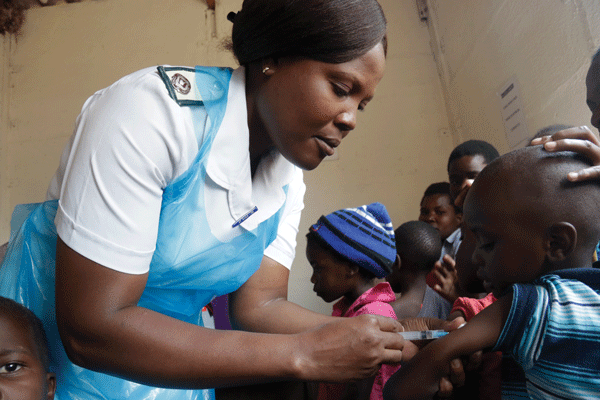
OPPOSITION parties and health stakeholders have reacted angrily to the deteriorating standards of healthcare in the country, with some calling for a complete overhaul of the entire ministry presiding over the decay.
BY PHYLLIS MBANJE

The health crisis in Zimbabwe is deepening and taking on a frightening plunge, with shocking reports that the country’s largest referral hospital, Harare Central, has run out of critical and basic drugs.
So serious is the situation that last weekend, the hospital had to shut down most surgeries except in cases of emergency and those involving maternal cases.
But this is not the first time that the hospital, built in 1941 and catering for more than 1 500 deliveries and handling 6 000 causalities per month, has raised the red flag.
The hospital is now struggling to offer quality services. The leaking roofs, peeling floors and cracked walls that become a breeding ground of agents that cause infections, are exposing hundreds of patients to more diseases.
This week, there was outrage over the suspension of surgeries at the hospital, which handles over 60% of all referrals countrywide.
Harare Central Hospital, which is literally falling to pieces with massive leakages from pipes within the walls, is in a dire position.
- Chamisa under fire over US$120K donation
- Mavhunga puts DeMbare into Chibuku quarterfinals
- Pension funds bet on Cabora Bassa oilfields
- Councils defy govt fire tender directive
Keep Reading
“This (suspension) is a symptom of a Zanu PF government that is overstretched, unaccountable and overwhelmingly failing the suffering citizens of Zimbabwe,” MDC spokesperson, Kurauone Chihwayi said.
The party further emphasised that the suspension of surgeries at the hospital, due to lack of drugs, is a reflection of the sorry state of public hospitals countrywide and a glaring consequence of the misplaced priorities of government.
“We view this latest disaster as a death sentence to citizens desperately in need of medical attention, who unlike the First Family and Zanu PF chefs, cannot afford the privilege of seeking treatment in Singapore, India, South Africa or private hospitals locally,” Chihwayi said.
MDC accused the government of sustaining “President Robert Mugabe’s merry-go-round trips around the world, which gobble up millions of dollars” while the health sector literally shuts down.
“It is clear that government’s only concern now is Mugabe’s happiness and not the well-being of its suffering millions,” Chihwayi said.
The People’s Democratic Party (PDP) secretary for health and child welfare, Sibongile Mgijima, said the deplorable state of public healthcare in Zimbabwe shows how the government has abandoned its priorities.
“Public healthcare is now in the intensive care unit due to serious shortages of basic medical services and medicine such as aspirin and antibiotics,” she said.
Two years ago, during a tour of the hospital, Harare Hospital’s chief executive officer, Peggy Zvavamwe admitted that the situation was dire, with quotations to repair a single ward requiring over $30 000.
“Our financial situation is dire and if we do not get relief soon, the quality of services will be compromised,” she said.
The hospital’s clinical director, George Vera, who was part of the tour, however, said their precarious situation was compounded by the fact that 40% of their patients were those over 65 years and the under-fives, who do not pay for services rendered.
Since then, nothing much has changed and the situation is now critical.
“We rely mostly on revenue from paying patients, but our situation is that 40% constitute the elderly and the under-five, whom we treat for free,” he said. “The referral system does not exist, we now receive people from everywhere and these are coming to die here.”
Health and Child Care minister David Parirenyatwa recently urged Zimbabwe to swallow its pride, in the face of dwindling resources for the public health delivery system and engage donors, among them the United States, in order to mobilise funds for the sector.
Parirenyatwa said, although the government had reversed the near collapse of public health delivery system, the country had not yet met its set goals and targets.
Community Working Group on Health (CWGH) director, Itai Rusike said, for poor Zimbabweans, public health investments have an impact in reducing household spending through provision of accessible, equitable and affordable disease prevention, health care and consequent reduction in losses of time and costs of consumption due to ill health.
“There is need to progressively move towards meeting the Abuja target of not only allocating 15% of the national budget to health, but actual spending of 15% of all government expenditures,” he said.
In a position paper on budget allocations for the health sector, CWGH said domestic funding remained skewed towards employment costs leaving little funds for operations costs, and capital programmes.
“As a solution, there should be a shift to performance based financing and needs based budgeting system, which will likely result in the narrowing of the gaps between the have and the have-nots,” Rusike said.
Close to 90% of hospitals and clinics in the country are operating without essential medicines in stock, while 80% of the posts for midwives remain vacant in the public sector, and over 3 000 nurses do not have jobs.











